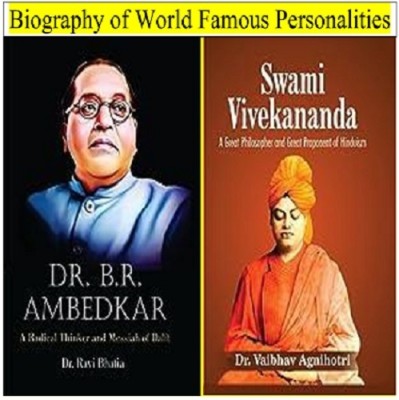Biography Of World Famous Personalities: B.R.Ambedkar & Swami Vivekananda(Hardcover, Dr. Ravi Bhatia & Dr. Vaibhav Agnihotri)
Quick Overview
Product Price Comparison
Bhimrao Ramji Ambedkar was born in the British-founded town and military cantonment of Mhow in the Central Provinces (now in Madhya Pradesh). He was the 14th and last child of Ramji Maloji Sakpal and Bhimabai. His family was of Marathi background from the town of Ambavade in the Ratnagiri district of modern-day Maharashtra. Upon IndiaŌĆÖs independence on August 15, 1947, the new Congress-led government invited Ambedkar to serve as the nationŌĆÖs first law minister, which he accepted. On August 29, Ambedkar was appointed Chairman of the Constitution Drafting Committee, charged by the Assembly to write free IndiaŌĆÖs new Constitution. Ambedkar won great praise from his colleagues and contemporary observers for his drafting work. In this task AmbedkarŌĆÖs study of sangha practice among early Buddhists and his extensive reading in Buddhist scriptures were to come to his aid. Sangha practice incorporated voting by ballot, rules of debate and precedence and the use of agendas, committees and proposals to conduct business. Sangha practice itself was modelled on the oligarchic system of governance followed by tribal republics of ancient India such as the Shakyas and the Lichchavis. Thus, although Ambedkar used Western models to give his Constitution shape, its spirit was Indian and, indeed, tribal. The book, which provides a rare opportunity to debate and discuss the contribution of philosophy of Bhim Rao Ambedkar in nation-building, will be great interest to all sections of people.Swami Vivekananda was a Hindu monk and one of the most celebrated spiritual leaders of India. He was more than just a spiritual mind; he was a prolific thinker, great orator and passionate patriot. He carried on the free-thinking philosophy of his guru, Ramakrishna Paramhansa forward into a new paradigm. He worked tirelessly towards betterment of the society, in servitude of the poor and needy, dedicating his all for his country. He was responsible for the revival of Hindu spiritualism and established Hinduism as a revered religion on world stage. His message of universal brotherhood and self-awakening remains relevant especially in the current backdrop of widespread political turmoil around the world. The young monk and his teachings have been an inspiration to many, and his words have become goals of self-improvement especially for the youth of the country. For this very reason, his birthday, January 12, is celebrated as the National Youth Day in India. Swami VivekanandŌĆÖs Guru, Ramkrushna Paramhans used to talk regularly with his disciples. He often used to narrate to his disciples stories about some devotees who appeared simple like any other devotee, but were different from others, in the sense that they used to perform spiritual practice even while living a worldly life. He also used to tell incidences that occurred in the life of great Sages that he had seen. He used to narrate stories of various Spiritually-evolved personalities and Sages. This book has very vividly, comprehensively and yet very concisely dealt with the life and thoughts of Swami Vivekananda. His commendation of the citizens of Japan while his visit to that place and his exhortation to our countrymen to emulate their virtues is a special feature of this book.


